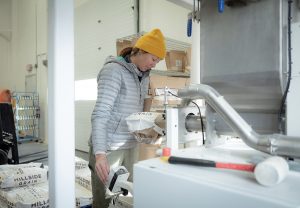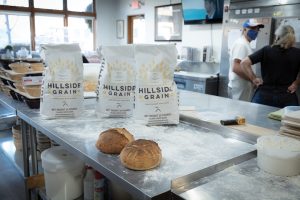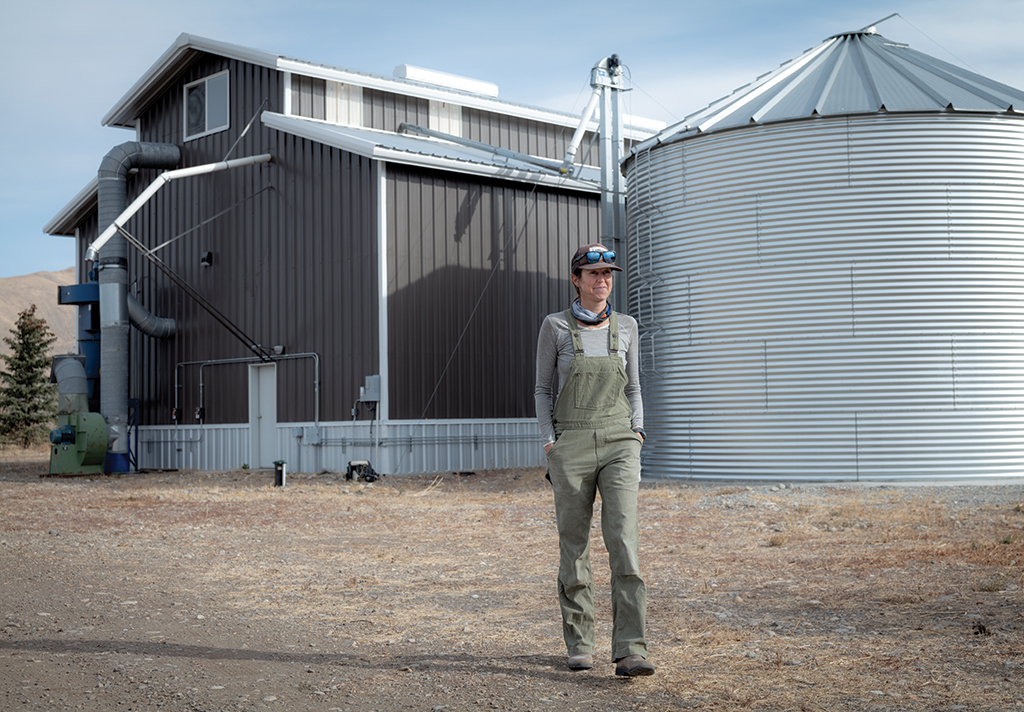When talking to Brett Stevenson, the founder of Hillside Grain, the excitement in her voice conveys the passion she has for what she does: growing grain and milling flour from her family’s farm in the Bellevue Triangle. What makes Hillside Grains unique is so much more than being a local farm making flour; this small farm is disrupting a centralized food system by using local grains to create craft flour. It’s changing our perception of flour from something that’s stripped of its nutrients, can be stored for years, and lacks flavor to something that’s flavorful, local, fresh, and nutritious. According to an article in The Atlantic, there were once at least 16,000 flour mills in this country; now there are less than 200. Stevenson is personally reviving this type of production in the Wood River Valley.
Hillside Ranch, the family-run farm that provides the grains for Hillside Grain, is located at the headwaters of Silver Creek in premium grain-growing country. Stevenson, 42, and her brother Justin (who works at the ranch improving water management and soil health) grew up on Hillside Ranch under the tutelage of their parents who began farming and ranching the land in the early ‘70s. Over time, Stevenson’s father John became an award-winning grain grower and a major contributor to the brewing industry—a job he still does today in his mid-80s.
“Growing up here pretty much created who my brother and I are,” Stevenson said. “The desire to build the farm mill was largely because I wanted to build on top of what my dad created and add my own chapter to the operation.”

What makes Hillside Grain’s flour so unique is the high-extraction process, its flavor and freshness, and the nutrients retained within the flour through that process. Most flour in our country is white flour that has been stripped of its bran and germ which is where all the flavor and nutritional value are. Those are often added back in as “enriched flour,” but this is a synthetic form of vitamins and minerals that isn’t as absorbable and loses its flavor. “People are used to that, to flour having no flavor. What’s crazy for me is going through this whole process and realizing how much awesome flavor is actually embedded in the wheat in a high-quality, high extraction,” said Stevenson. People are also used to flour with a long shelf life whereas Hillside Grains flours are semi-perishable. There are often chemicals used in typical flour production such as bromate, a conditioner that is banned in China, Europe, and Canada, but which is still used in the U.S. (though not at Hillside).
The short supply chain for Stevenson’s flours also sets it apart. While there are many large-scale flour producers and a resurrection of small-scale, artisan ones, Stevenson counts herself in a grey area in-between those two ends of the spectrum, which is an area that there’s very little of in the U.S. Her grain is grown on the farm and the mill is just across the road. Stevenson sees the problems in having a centralized food system (which large-scale production creates), especially during times like these, and notes that local food systems often fare better during times of national crisis.
“It’s fascinating to see how a pandemic becomes one of the threats [to a centralized food system],” said Stevenson. “The supposed ‘flour shortage’ we experienced in the spring, and a bit now, wasn’t so much an actual flour shortage, it is about trying to redirect that flour supply to the grocery stores and those large facilities have a much harder time doing that.”
When the pandemic started, Hillside Grains was primarily geared toward wholesale and bulk sales to bakeries. But when demand from home bakers went up, she began putting together four-pound bags much sooner than she expected. “It’s so cool to see so many people baking at home and appreciating how good fermented sourdough breads and home-baked breads are, and how fun and cathartic and rewarding baking at home can be.”

Hillside also has both a roller and stone mill; the only other place with a similar system is Cairnspring Mills in Washington which supplies 100% of the flour to San Francisco’s famous Tartine Bakery. At the moment, Hillside Grain is carried locally at Atkinson’s in Hailey and Bellevue, Café Della, Ketchum Kitchen’s, Kraay’s Market, and both Boise Co-op locations. Several high-extraction varieties are usually available and sometimes some rye or barley flour. Stevenson has also been experimenting with some grain varieties from the Bread Lab at Washington State University which will hopefully lead to more flour variety.
“People don’t understand what is going on with wheat and flour; they think it’s stagnant and boring,” Stevenson said. “We’re a grain-growing country. If you want to talk about local and regional food—the farmer’s market is rad—but by far and above, we’re so well-suited for grain. If you delve into it a bit, grain can be fascinating.”
For more information or for wholesale and bulk orders, visit hillsidegrain.com.


